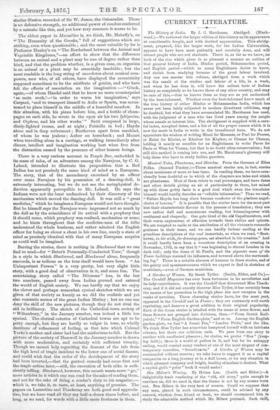Musical Tales, Phantasms, and Sketches. From the German of Elise
Polko. (Samuel Tinsley.)—These musical stories are, in fact, stories about musicians of more or less fame. In reading them, we have occa- sionally been doubtful as to which of tho chapters are tales and which are phantasms. Most of them relate to real personages, and have dates and other details giving an air of particularity to them, but mixed up with these gritty facts is a good deal which even the translator himself would hardly describe as "reliable information." Thus we read, "Father Haydn has long since become conductor of the glorious angel- choirs of heaven." It is possible that the stories have for the most part lost their characteristio flavour in the process of translation ; they are now rather dull and monotonous reading, but brimming-over with sentiment and rhapsody. One gets tired of the oli Capellmoisters, and their warm expressions of affection towards their violins and spinets. We are tempted to smile at the attribution of all the virtues to romantic geniuses in their teens, and we can hardly forbear smiling at the grandiose descriptions of the real immortals, as when we read, "Beet- hoven. in his wide, fur dressing-gown, sat absorbed in his creation." And it could hardly have been a veracious description of an evening in November, 1762, to say that it "was beginning to shroud London in its dark veil ; only the dome of St. Paul's, and the gigantic mass of the Tower buildings resisted its influence, and towered above the surround- ing fog." There is a notable absence of humour in those stories, and of the gaiety and spontaneousness which we expect to find in sketches of musicians,—even of German musicians.


































 Previous page
Previous page